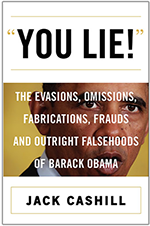But Would You Have Invaded Libya?
Get your copy of Jack Cashill's latest book, "You Lie!"

___
Get your copy of Deconstructing Obama

___
Jack Cashill's book:
Hoodwinked: How Intellectual Hucksters have Hijacked American Culture
© Jack Cashill
WND.com - May 27, 2015
Largely to protect Hillary Clinton’s future, the media have been pestering Republican candidates with the question, “Would you have invaded Iraq?”
This question serves at least two purposes. For one, it shifts the blame for Barack Obama’s tragically botched handling of Iraq back to Bush.
For another, a hypothetical “yes” answer from a Republican candidate, none of whom were in a position to vote for the war in 2002, negates Clinton’s actual “yes” vote.
A more relevant and timely question, one the Republican candidates ought to suggest themselves, is whether they would have voted to support the war against Libya in 2011.
The candidates might then answer, “Sorry, unlike with Iraq, we were not even allowed a vote on the extra-constitutional war.” Score one.
Were the candidates to go deeper on the Libyan misadventure, they could share with the audience the spectacular dishonesty and ineptitude of the Obama/Clinton foreign policy.
The story might begin with Obama’s address to the nation in late March 2011. “We knew that if we . . .waited one more day,” said Obama, “Benghazi, a city nearly the size of Charlotte, could suffer a massacre that would have reverberated across the region and stained the conscience of the world.”
“I refused to let that happen,” added Obama in a radio address. Instead, he authorized military action “to stop the killing” and enforce U.N. Security Council Resolution 1973.
Less than two months earlier, Obama had not so much as mentioned this benighted country in his State of the Union address.
The last time Qaddafi had gotten much play in the America media was 2003 when he was persuaded to abandon his WMD program. As recently as April 2009, Qaddafi’s son had a friendly meeting with Clinton in Washington.
In March 2011, the good will Qaddafi had mustered suddenly lost all value. Obama asked America to believe he was committing the United States to war to prevent a Rwanda-sized stain on “ the conscience of the world.”
If Obama had studied the 1999 Kosovo action—and Clinton was there to help him—he would have known how the media would react if a Democrat president launched an unauthorized air war.
At the time, Yugoslavia was fracturing. To hold the country together, the mostly Serbian authorities were attempting to suppress an insurrection by ethnic Albanians in the Kosovo province.
Like Obama, President Bill Clinton had not bothered getting congressional approval before sending our planes in. To bolster public support, Clinton and his people began a drumbeat about mass graves, ethnic cleansing and even genocide.
As in Libya, there was no other reason for the war other than to prevent genocide. Yugoslavia had no WMDs, no terror arm, no ambitions on its neighbors, no grudge against the United States, no sheltered terrorists, not even any oil.
President Clinton compared the work of the Serbs in Kosovo to the German “genocide” of the Jews during the Holocaust and assured America that “tens of thousands of people” had been murdered.
In the war’s wake, however, international teams could find no signs of genocide. Spanish forensic surgeon Emilio Perez Pujol would tell the British Sunday Times that the talk of genocide was “a semantic pirouette by the war propaganda machines, because we did not find one—not one—mass grave.”
For the Libyan conflict, Alan Kuperman, a professor of public affairs at the University of Texas, did the calculations that the media refused to do.
Writing in the Boston Globe just two weeks after the President’s address on Libya, Kuperman made the simple point, “The best evidence that Khadafy did not plan genocide in Benghazi is that he did not perpetrate it in the other cities he had recaptured.”
As Kuperman also noted, the ubiquitous cell phone cameras failed to capture any images of a massacre. No political partisan, Kuperman previously served as a legislative assistant to Democrat House Speaker Tom Foley and legislative director for then Congressman Chuck Schumer.
What did happen in Libya, Kuperman explained, is that rebel forces, fearing imminent defeat, followed the Kosovo playbook and faked a humanitarian crisis.
On March 21, The New York Times’s David Kirpatrick reported, “The rebels feel no loyalty to the truth in shaping their propaganda, claiming nonexistent battlefield victories, asserting they were still fighting in a key city days after it fell to Qaddafi forces, and making vastly inflated claims of his barbaric behavior.”
By the time the bombing began, Obama had to know the pretext for war was false, but he would continue to pursue it for another six deadly months.
As 2011 sped by, the insurgency dragged on, and the only sure casualty was the truth. On October 20, 2011, NATO planes attacked a convoy among whose passengers was a desperate Qaddafi.
Qaddafi fled the shattered convoy on foot and was captured. The militia members took Qaddafi prisoner, indelicately sodomized him with a knife, and captured it all on video. This was not quite the image of a new Libya Obama and Clinton were hoping to project.
They just ignored it. Said Obama in a Rose Garden speech, "The dark shadow of tyranny has been lifted." He and Clinton championed the victors and made Libya their personal success story.
The biggest misconception about NATO’s intervention,” wrote Kuperman, “is that it saved lives and benefited Libya and its neighbors.”
In fact, Qaddafi did not attack peaceful protesters. The rebels started the violence, and Qaddafi responded. Barely six weeks after the rebellion started, Qaddafi had all but suppressed it at the cost of about one thousand lives.
Then Clinton and Obama blessed NATO’s intervention, one that prolonged the war seven months and cost roughly seven thousand more lives.
During the insurrection, the Obama administration had been funneling money to Qatar to help arm Libyans rebels. As the New York Times reported, “The weapons and money from Qatar strengthened militant groups in Libya, allowing them to become a destabilizing force since the fall of the Qaddafi government.”
After the fall of Qaddafi, these groups refused to disarm and continued to resist government authority. In the midst of this mess, in early April 2011, American special representative Chris Stevens arrived in Libya on board a Greek freighter.
Obama and Clinton would reward his loyalty and courage with the most disturbing lies of their relentlessly dishonest careers.
The Republican candidates need to hammer this home.


